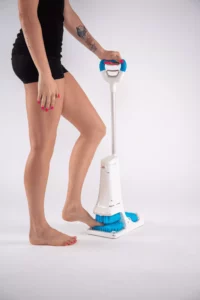Diabetes, a chronic condition affecting millions globally, necessitates meticulous management, particularly when it comes to foot care. For individuals with diabetes, even minor foot issues can escalate into serious complications due to altered blood flow and nerve damage. One common query among diabetic patients is whether the use of foot scrubbers is safe and advisable. This article delves into the complexities of diabetic foot care, specifically examining the safety and implications of using foot scrubbers.
Firstly, understanding diabetic neuropathy is crucial as it significantly impacts foot health. Neuropathy can reduce sensation in the feet, leaving individuals unaware of injuries and infections. Secondly, we explore the heightened risk of infection in diabetic feet, which can be exacerbated by seemingly benign tools like foot scrubbers that might introduce micro-tears in the skin. Thirdly, the importance of gentle foot care is discussed, emphasizing methods that minimize the risk of injury. Fourthly, we consider recommendations from healthcare professionals regarding the use of foot scrubbers and other foot care practices. Lastly, we provide insights into safer alternatives to mechanical foot scrubbers, which can offer effective exfoliation without compromising the skin’s integrity. Through this comprehensive exploration, the article aims to guide diabetic patients in maintaining optimal foot health and preventing complications.
Understanding Diabetic Neuropathy
Diabetic neuropathy refers to the nerve damage that often occurs in people with diabetes. This condition is a significant subtopic when considering foot care in diabetic patients, particularly related to the use of foot scrubbers. Diabetic neuropathy primarily affects the nerves in the legs and feet. As a result, individuals with this condition may not be able to feel their feet properly or may experience tingling, pain, or weakness in the area. This loss of sensation is particularly concerning because it increases the risk of injury and infection, as cuts, sores, or changes in skin condition might not be immediately noticed by the patient.
Because of the numbness or reduced sensation caused by neuropathy, diabetic patients might not feel irritation or damage caused by mechanical foot scrubbers. Using such devices can lead to unintentional injuries, which can go unnoticed and thus untreated for some time. These injuries can potentially lead to infections, which are more difficult to manage in diabetic individuals due to the slowed healing process associated with diabetes.
Therefore, the use of mechanical foot scrubbers in diabetic patients with neuropathy is generally advised against. Patients are encouraged to conduct regular visual checks of their feet to monitor any changes or injuries and to maintain good foot hygiene through safer, gentler methods. Consulting with healthcare professionals about appropriate foot care strategies and following their recommendations is crucial in preventing complications associated with diabetic foot issues.
Risk of Infection in Diabetic Feet
Diabetic individuals often face increased risks regarding foot health, with the risk of infection being a particularly significant concern. Due to impaired blood circulation and nerve damage (neuropathy) that often accompanies diabetes, even minor cuts or abrasions can lead to serious complications. Neuropathy reduces sensation in the feet, so a diabetic might not immediately notice these injuries, allowing them to worsen unnoticed.
The skin of diabetic feet can also become dry and crack, potentially providing entry points for bacteria and other pathogens. Once an infection sets in, impaired circulation means that fewer immune cells can reach the site to fight off the infection, and healing processes are slowed. This makes it imperative for diabetics to exercise caution and prioritize maintaining clean, dry, and protected feet.
Considering these factors, the use of foot scrubbers, which can create abrasions or exacerbate minor wounds, might not be advisable for all diabetics. Instead, gentle washing with a soft cloth or sponge is recommended, along with thorough drying, especially between the toes. Diabetics should inspect their feet daily for any signs of injury or infection and consult with healthcare professionals regularly to ensure proper foot care practices are followed.
Importance of Gentle Foot Care
The importance of gentle foot care cannot be overstated, especially for individuals with diabetes. People with diabetes often suffer from diabetic neuropathy, a condition where high blood sugar levels cause damage to nerve fibers, primarily affecting the feet and legs. This damage can lead to a loss of feeling in the feet, making it difficult for individuals to notice injuries, infections, or irritations. Therefore, gentle foot care becomes crucial to prevent complications.
Gentle foot care involves several practices. Firstly, it is advisable to wash the feet daily using warm water and mild soap, ensuring the water is not too hot to prevent burns that might go unnoticed due to neuropathy. After washing, it is important to thoroughly dry the feet, especially between the toes, to prevent fungal infections. Moisturizing the feet is also essential but should be avoided between the toes to reduce the risk of fungal growth.
Moreover, diabetic individuals should inspect their feet daily for any cuts, blisters, redness, or swelling. Since neuropathy may impair sensation, visual inspection helps in early detection of potential problems. It is also recommended to wear well-fitting, comfortable shoes and avoid walking barefoot to reduce the risk of injury.
In the context of using foot scrubbers, it is essential to approach with caution. Mechanical foot scrubbers can be too harsh for sensitive diabetic feet and may cause scratches or remove too much skin, leading to an increased risk of infection or skin breakdown. Hence, opting for a soft sponge or a gentle washcloth is a safer alternative for exfoliating and cleaning the feet.
In conclusion, practicing gentle foot care is a key aspect of managing diabetes and preventing serious complications. It requires consistent and mindful practices to ensure foot health and prevent injuries that could lead to infections and possibly more severe outcomes. Individuals with diabetes should consult healthcare professionals to develop a foot care routine that specifically suits their needs.
Recommendations by Healthcare Professionals
When addressing diabetic foot issues, healthcare professionals typically emphasize the importance of personalized care and caution. Due to the heightened risk of infections and the reduced sensitivity in the feet caused by conditions such as diabetic neuropathy, specific recommendations are often given to individuals with diabetes.
Healthcare professionals usually advise against the use of mechanical foot scrubbers for those with diabetes, particularly if they have significant neuropathy or poor circulation. The concern is that mechanical scrubbers can cause abrasions or cuts, which the individual may not feel due to neuropathy. These injuries can easily become infected, presenting serious complications.
Instead, healthcare professionals often recommend gentler methods of foot care. This may include using a soft washcloth, mild soaps, and moisturizers to prevent the skin from drying out and cracking. They also stress the importance of regular inspections of the feet to catch any issues early before they develop into more severe problems. Regular check-ups with a healthcare provider are also part of the recommended routine to ensure any issues are addressed promptly and appropriately.
In essence, while foot scrubbers might be suitable for individuals without underlying health issues, for those with diabetes, particularly those with foot complications, the advice of healthcare professionals typically leans towards more cautious and gentler foot care practices. This tailored approach helps to prevent potential complications and supports overall foot health in diabetic patients.
Alternatives to Mechanical Foot Scrubbers
When considering foot care for individuals with diabetes, particularly those with sensitive or compromised foot health, mechanical foot scrubbers might not always be the best choice. Diabetic patients often suffer from neuropathy, which can reduce sensation in their feet. This lack of feeling increases the risk of injury from mechanical foot scrubbers, as they may not perceive the pressure or abrasion until damage has occurred.
Instead of mechanical foot scrubbers, gentler alternatives are advised for diabetic foot care. Soft washcloths or sponges can be effective for cleaning the feet without causing abrasions. These alternatives are less aggressive and offer a safer option for removing dirt and maintaining hygiene. Additionally, using mild, non-irritating soaps during washing can prevent skin irritation and promote overall foot health.
For hydration and to prevent cracks or dry skin, which could potentially lead to infections, moisturizers specifically formulated for sensitive skin can be beneficial. Applying these after gently washing the feet ensures that the skin remains supple and less prone to breaks. It is essential for individuals with diabetes to inspect their feet daily for any signs of cuts, blisters, or infections, utilizing a mirror if necessary to view the sole of the foot.
In conclusion, while mechanical foot scrubbers can be too harsh for those with diabetic foot issues, many softer, safer alternatives can be used to maintain proper foot hygiene and health. Regular consultation with healthcare professionals can also provide personalized advice and recommendations tailored to each individual’s needs, helping to manage diabetic foot care effectively.




